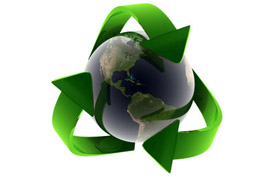Battery Disposal Guide
Sep 1st 2017
If you are having a difficult time finding out what to do with used batteries and where you can take them to be recycled or safely treated and disposed, then you should find a solution here on this page.
When it comes time to replace your batteries, make sure you are disposing of the old batteries properly so no laws are broken. Check with your local solid waste management district (listed under County Government in your phone book) for any outlets for household battery recycling. For disposal of small quantities of batteries, see if your local hardware/auto parts store or battery retailer will accept them for recycling. Most large battery recycling agencies and disposal companies are usually set up to serve industrial or municipal customers with bulk amounts of batteries rather than individuals.
| Battery Type | Common Name | Sizes | Usage Examples | Disposal Classification | Proper Disposal |
| Alkaline (maganese) | Coppertop, Alkaline | AAA, AA, C, D, 6V, 9V | Flashlights, calculators, toys, clocks, smoke alarms, remote controls | Non-Hazardous | Trash (normal municipal waste). Exceptions: California, which requires non-households to dispose of these batteries in accordance with the California Universal Waste Rules. Also, Minnesota (Hennepin County only) requires these batteries be disposed as a hazardous waste |
| Button | Alkaline, Lithium, Mercuric Oxide, Silver Oxide, Zinc-Air | Sizes vary | Watches, hearing aids, toys, greeting cards, and remote controls | Hazardous Waste | Household Hazardous Waste Collection Site |
| Carbon Zinc (non-Mercury) | Classic, Heavy Duty, General Purpose, All Purpose, Power Cell | AAA, AA, C, D, 6V, 9V | Flashlights, calculators, toys, clocks, smoke alarms, remote controls, transistor radios, and garage door openers | Non-hazardous | Trash (normal municipal waste). Exceptions: California- requires non-households to dispose of these batteries in accordance with the California Universal Waste Rules. Minnesota (Hennepin County only)- requires these batteries be disposed as a hazardous waste |
| Lithium | Lithium, Lithium Ion, Li-Ion | Sizes vary | Laptops, cell phones, digital cameras, camcorders, mp3 players | Hazardous Waste | Recycle |
| Nickel-Cadmium (Rechargeable) | Either unlabeled or labeled Ni-Cd | Sizes vary | Camcorders, power tools, two-way radios, cordless phones | Hazardous Waste | Recycle or Household Hazardous Waste Collection Site |
| Nickel Metal Hydride (Rechargeable) | Either unlabeled or labeled Ni-MH or Ni-Hydride | Sizes Vary | Camcorders, power tools, two-way radios, cordless phones, AA rechargeable batteries | Non-hazardous waste | Recycle or place in the trash (normal municipal waste). Exceptions: California- requires non-households to dispose of these batteries in accordance with the California Universal Waste Rules. Minnesota (Hennepin County only); requires these batteries be disposed as a hazardous waste |
| Sealed Lead Acid | SLA, AGM | 2V, 6V, 12V | UPS Back-Up systems, wheel chairs, ATV’s, Jet Skis | Hazardous Waste | Recycle |
| Lead Acid (Wet cell) | Automobile Battery | 6V, 12V | Automobiles | Hazardous Waste | Recycle. Stores that sell car batteries are required to accept up to 5 car batteries from 1 customer for no charge. |
| Mercury Oxide | Mercury Oxide | Mostly button. Sizes vary | Watches, hearing aids, toys, greeting cards, remote controls | Hazardous Waste | Household Hazardous Waste Collection Site |
| Silver Oxide | Silver Oxide | Mostly button. Sizes vary | Watches, hearing aids, toys, greeting cards, remote controls | Hazardous Waste | Consumers are covered by the Household exemption under RCRA which allows for these batteries to be disposed of into the municipal waste stream. Non-Consumers must dispose of these batteries in full compliance with the hazardous waste rules. These batteries are also acceptable for recycling by the Rechargeable Battery Recycling Corporation's (RBRC) Battery Recycling Program |
